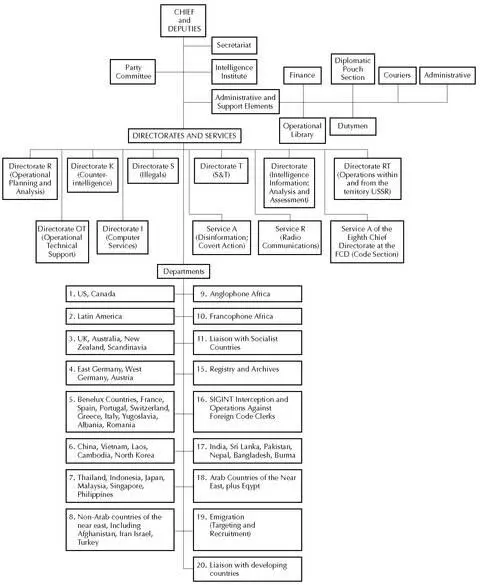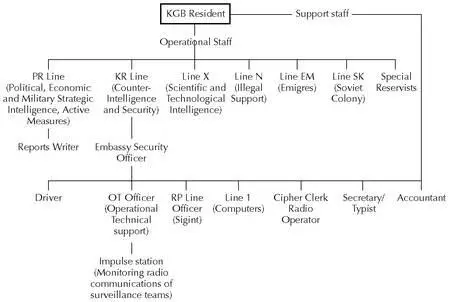In the search for its own identity at the beginning of the twenty-first century, the SVR looks back to a heroic, reinvented version of its Soviet past. On December 20, 1995 it celebrated the seventy-fifth anniversary of the founding of the Cheka’s foreign department as its own seventy-fifth birthday, and marked the occasion by publishing an uncritical eulogy of the “large number of glorious deeds” performed by Soviet foreign intelligence officers “who have made an outstanding contribution to guaranteeing the security of our Homeland.” The SVR copes with the unfortunate fact that some of its past heroes perpetrated or collaborated in the atrocities of the Great Terror by denying, absurdly, that they played any part in them. In the SVR version of the Terror, the sole involvement of foreign intelligence was to produce martyrs who “perished in the torture chambers of Yezhov and Beria.” 77As head of the SVR, Primakov became “editor-in-chief” of a multi-volume history of Soviet foreign intelligence designed to demonstrate that Soviet foreign intelligence “honorably and unselfishly did its patriotic duty to Motherland and people.” 78Though Primakov’s history has yet to reach the Cold War era, it is already clear that there will be no place in it for any account of FCD involvement in the persecution of dissidents and the abuse of human rights.
In 1996 the SVR issued a CD-ROM in both Russian and English, with the title Russian Foreign Intelligence: VChK [ Cheka ] -KGB-SVR, which claims to give “for the first time… a professional view on the history and development of one of the most powerful secret services in the world.” The aim throughout its multimedia celebration of past successes, such as the recruitment of the Magnificent Five and atomic espionage, is to emphasize the direct links between Soviet foreign intelligence and today’s SVR. The cover of the CD-ROM depicts the statue of Dzerzhinsky which the SVR and FSB now hope to see re-erected on its former pedestal outside the Lubyanka. Nothing better illustrates the continuity between the Soviet and Russian foreign intelligence services than the attempt by the SVR to reclaim its KGB past.
APPENDIX A
KGB CHAIRMEN, 1917-91
Feliks Edmundovich Dzerzhinsky 1917-26 (Cheka/GPU/OGPU)
Vyacheslav Rudolfovich Menzhinsky 1926-34 (OGPU)
Genrikh Grigoryevich Yagoda 1934-6 (NKVD)
Nikolai Ivanovich Yezhov 1936-8 (NKVD)
Lavrenti Pavlovich Beria 1938-41 (NKVD)
Vsevelod Nikolayevich Merkulov 1941 (February-July) (NKGB)
Lavrenti Pavlovich Beria 1941-3 (NKVD)
Vsevelod Nikolayevich Merkulov 1943-6 (NKGB/MGB)
Viktor Semyonovich Abakumov 1946-51 (MGB)
Semyon Denisovich Ignatyev 1951-3 (MGB)
Lavrenti Pavlovich Beria 1953 (March-June) (MGB)
Sergei Nikiforovich Kruglov 1953-4 (MGB)
Ivan Aleksandrovich Serov 1954-8 (KGB)
Aleksandr Nikolayevich Shelepin 1958-61 (KGB)
Vladimir Yefimovich Semichastny 1961-7 (KGB)
Yuri Vladimirovich Andropov 1967-82 (KGB)
Vitali Vasilyevich Fedorchuk 1982 (May-December) (KGB)
Viktor Mikhailovich Chebrikov 1982-8 (KGB)
Vladimir Aleksandrovich Kryuchkov 1988-91 (KGB)
Vadim Viktorovich Bakatin 1991 (August-December) (KGB)
APPENDIX B
HEADS OF FOREIGN INTELLIGENCE, 1920-99
Yakov Kristoforovich Davryan (Davydov) 1920-1 (Cheka)
Solomon Grigoryevich Mogilevsky 1921 (Cheka)
Mikhail Abramovich Trilisser 1921-30 (Cheka/GPU/OGPU)
Artur Khristyanovich Artuzov 1930-6 (OGPU/NKVD)
Abram Abramovich Slutsky 1936-8 (NKVD)
Zelman I. Pasov 1938 (NKVD)
Sergei Mikhailovich Shpigelglas 1938 (NKVD)
Vladimir Georgiyevich Dekanozov 1938-9 (NKVD)
Pavel Mikhailovich Fitin 1939-46 (NKVD/NKGB/NKVD/MGB)
Pyotr Nikolayevich Kubatkin 1946 (June-September) (MGB)
Pyotr Vasilyevich Fedotov 1946-9 (Deputy Chairman, KI, 1947-9)
Sergei Romanovich Savchenko 1949-52 (Deputy Chairman, KI, 1949-51)
Yevgeni Petrovich Pitovranov 1952-3 (MGB)
Vasili Stepanovich Ryasnoy 1953 (March-June) (MGB)
Aleksandr Semyonovich Panyushkin 1953-6 (MGB/KGB)
Aleksandr Mikhailovich Sakharovsky 1956-71 (KGB)
Fyodor Konstantinovich Mortin 1971-4 (KGB)
Vladimir Aleksandrovich Kryuchkov 1974-88 (KGB)
Leonid Vladimirovich Shebarshin 1988-91 (KGB)
Yevgeni Maksimovich Primakov 1991-6 (SVR)
Vyacheslav Ivanovich Trubnikov 1996- (SVR)
APPENDIX C
THE ORGANIZATION OF THE KGB

Source: Desmond Ball and Robert Windren, ‘Soviet Signals Intelligence (Sigint): Organisation and Management,’ Intelligence and National Security, vol. 4 (1989), no. 4; Christopher Andrew and Oleg Gordievsky, KGB: The Inside Story of Its Foreign Operations from Lenin to Gorbachev, paperback edition (London: Sceptre, 1991); and Mitrokhin.
APPENDIX D
THE ORGANIZATION OF THE KGB FIRST CHIEF DIRECTORATE (FOREIGN INTELLIGENCE)

Source: Desmond Ball and Robert Windren, ‘Soviet Signals Intelligence (Sigint): Organisation and Management,’ Intelligence and National Security, vol. 4 (1989), no. 4; Christopher Andrew and Oleg Gordievsky, KGB: The Inside Story of Its Foreign Operations from Lenin to Gorbachev, paperback edition (London: Sceptre, 1991); and Mitrokhin.
APPENDIX E
THE ORGANIZATION OF A KGB RESIDENCY
Chapter One
The Mitrokhin Archive
1. Nezavisimaya Gazeta, December 10, 1996; Reuter reports, December 10, 1996.
2. Unless otherwise indicated, the account of Mitrokhin’s career is based on his own recollections. Because of concern for his relatives in Russia, he is reluctant to reveal details of his family background. The SVR is still ferociously hostile to KGB defectors, whatever their motives. Most, even if—like Oleg Gordievsky—they betrayed not Russia but the now discredited Soviet one-party state through ideological conviction, remain under sentence of death. Though their relatives no longer face the overt persecution of the Soviet era, many understandably prefer not to have them identified.
3. For personal reasons, Mitrokhin does not wish to make public the location of this foreign posting, where he operated under an alias.
4. On the fall of Beria, see Moskalenko, “Beria’s Arrest”; Volkogonov, The Rise and Fall of the Soviet Empire, pp. 185-93; Knight, Beria, ch. 9.
5. The FCD Archives, known in 1956 as the Operational Records Department ( Otdel Operativnogo Ucheta ), were subsequently renamed the Twelfth (later the Fifteenth) Department.
6. Volkogonov, The Rise and Fall of the Soviet Empire, p. 194.
7. Fleishman, Boris Pasternak, chs. 11,12; Levi, Boris Pasternak, chs. 8, 9.
8. Knight, The KGB, pp. 64-5.
9. k-9,183.
10. Medvedev, Andropov, p. 56.
11. Andrew and Gordievsky, KGB, pp. 434-5, 483-4; Arbatov, The System, p. 266; Dobbs, Down With Big Brother, p. 13.
12. k-25,1.
13. k-1,191. Because of the dissidents’ contacts (both real and imagined) with the West and the expulsion of some of their leaders, FCD archives included material on them from both the Second (internal security) Chief Directorate and the Fifth Directorate, founded by Andropov to specialize in operations by domestic ideological subversion.
Читать дальше














